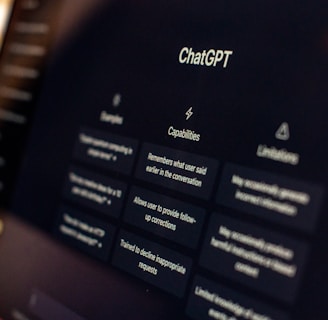🧠 How Does ChatGPT Actually Work? (What They Don’t Tell You)
Ever wondered, “How does ChatGPT actually work?” This deep-dive guide breaks it down in plain English — no tech jargon, just clear, real-world explanations. Discover what’s happening behind the scenes when you type a prompt, how ChatGPT is trained, why it responds the way it does, and how to use it like a pro. Packed with insider insights and practical tips to unlock its full potential.


Ever found yourself wondering, how does ChatGPT actually work? You’re not alone.
The idea that a machine can write full blog posts, plan vacations, or talk like your best friend is wild. But understanding what’s really going on under the hood? That’s where the magic is.
If past explanations left you scratching your head or bored to tears… buckle up. We’re diving into this tech—not from a nerdy lecture hall—but from the control room where real creators get stuff done.
🤯 Why Most People Get It Wrong
Let’s be real. Most explanations are either:
So basic it sounds like a talking calculator
Or so technical it feels like reading a NASA manual
Here’s the truth:
ChatGPT isn’t “smart” like a person…
It’s not a Google replacement…
And it doesn’t “know” things in the way we do.
But once you understand how it actually works?
You can use it 10X smarter than the average user.
🔍 First—Let’s Clear Up Some Myths
Before we decode the tech, let’s hit pause on a few assumptions:
❌ It’s not conscious
❌ It doesn’t learn from you personally
❌ It doesn’t access the live internet (unless enabled)
❌ It doesn’t “know” truth — it predicts based on patterns
Cool? Cool.
⚙️ So… What Actually Happens When You Type?
You hit enter, and ChatGPT replies instantly. But behind the scenes?
Here’s the simplified rundown:
✅ 1. Tokenization
Your sentence gets split into small chunks called “tokens.”
Example: chatbot → chat + bot.
This allows more precise handling of language.
✅ 2. Pattern Prediction
ChatGPT compares your input with patterns it learned from billions of pages during training.
It's not recalling a fact — it's predicting the most likely next word.
✅ 3. Transformer Model
This is the secret sauce — the engine that runs the whole thing.
It can “look at” everything you wrote, all at once, and decide what to focus on.
This is done through...
✅ 4. Attention Mechanism
It’s like mental highlighters:
If you ask about “best pizza toppings,” it gives more weight to “pepperoni” than “quantum mechanics.”
And that’s why it feels like it “gets you.”
🎯 How ChatGPT Was Trained (This Part’s Wild)
Let’s split it into 3 key phases:
🧪 Pre-Training
It read a LOT of text — books, blogs, Reddit threads, Wikipedia… you name it.
It wasn’t “taught” like a student — it just observed patterns.
Repeatedly guessing the next word in a sentence is how it got so fluent.
🔧 Fine-Tuning
After raw training, it was refined using curated, hand-picked conversations.
This helps it sound helpful instead of like a drunk philosopher.
🤝 Human Feedback Loop (RLHF)
Real people ranked responses → The model learned what sounded most helpful.
It’s like having a feedback coach giving gold stars and red X’s.
🗣️ Why It Feels So Conversational
Three lesser-known features give ChatGPT that natural, flowy feel:
Memory (sort of): It remembers recent tokens in your chat (but not long-term).
Instruction tuning: Later versions respond better to commands and instructions.
Temperature: A hidden setting that controls creativity. (Higher = wilder, lower = safer.)
Want better output? Prompt it with examples. It mimics your structure like a champ.
🤫 What ChatGPT Does Learn from Users
No, it’s not spying on your chats.
But it does get smarter through something called aggregate usage patterns.
🧩 When a lot of users correct the same kind of response,
💡 Future model versions adapt to avoid those mistakes.
So while your chat isn’t stored forever, your patterns help the next generation improve.
🆚 GPT vs. Traditional Chatbots
Here’s how it stacks up:
FeatureChatGPTOld-School ChatbotsLanguage FlowNatural and dynamicRobotic, canned phrasesContext AwarenessHandles longer conversationsOne-step-at-a-time onlyPersonalityAdaptableBland and genericCreativity & ReasoningSurprising depthScripted, limitedVersatilityWriting, coding, teachingMostly customer service
💼 How Smart Users Are Actually Using It
Sure, it can write blog posts. But the real power users are doing things like:
🛒 Product Research Summary
Paste 20 Amazon reviews → Ask for common pros/cons.
📚 Course Planning
Ask for a 6-week outline with milestones.
💡 Marketing Hook Generator
Give it your product and audience → Get 15 email subject lines.
🧠 Code Explainer
Drop in a mess of JavaScript → Get a clean breakdown in seconds.
🧾 Legal Doc Translator
Paste legalese → “Explain this like I’m 12.”
⚙️ Customer Service Bot
Feed in your FAQ sheet → Use it as a 24/7 support agent.
If you're only using it to “write stuff,” you're leaving 80% of the value on the table.
⚠️ Limits You Should Know
Despite its brilliance, it’s got some guardrails:
❗ Hallucinations happen
It’ll say false things with absolute confidence. Always fact-check.🕑 No real-time news
It doesn’t know what happened today unless web-browsing is enabled.⏳ Token limits
Too long of a chat? It starts to forget earlier parts of the convo.🔐 Sensitive info? Nope.
Don’t feed it passwords, IDs, or confidential material.
🔎 FAQ Time (Great for Google Snippets)
🤔 How does ChatGPT actually work in plain English?
It breaks down your text, compares it to what it learned from billions of examples, and predicts the most likely next word — all in milliseconds.
📚 What is it trained on?
Publicly available text, including books, articles, websites, Wikipedia, and conversations — nothing behind paywalls or private data.
🧠 Does ChatGPT learn from individual chats?
Not directly. But aggregated feedback helps future versions improve.
💡 What’s the difference between GPT-3 and GPT-4?
GPT-4 is more accurate, handles complex instructions better, and has a longer context memory. Think “smart” vs. “supernatural.”
🔮 The Future of ChatGPT: What’s Coming
Here’s what’s quietly being built into newer versions:
📸 Image + Audio input
Multimodal models that understand images, voice, and video
🔧 Tool plugins
Imagine ChatGPT controlling your calendar, Google Sheets, or Canva
🧠 Persistent memory
Custom bots that remember your tone, brand, and even preferences
💻 On-device AI
No more lag — blazing fast assistants built right into your devices
Tip: Start building your workflows around AI now. The edge goes to the early movers.
🚀 Final Take: Don’t Just Use ChatGPT — Master It
You came in asking “how does ChatGPT actually work,” and now you’ve unlocked a level of understanding most users never reach.
So now what?
Try new use cases (not just blog writing)
Build a swipe file of prompt templates
Use it to automate your systems — not just tasks
Knowledge is power. But applied knowledge? That’s income, efficiency, and freedom.
🔥 Want more practical AI mastery tips?
Subscribe. Bookmark. Or just keep this tab open forever.
Here's a infographic of the above article I created with.... You guessed it, AI! (In case you need visuals)
© 2025 AI Mindfuel. All Rights Reserved.
